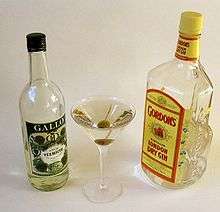Three-martini lunch
The three-martini lunch or noontime three-martini is a term used in the United States to describe a leisurely, indulgent lunch enjoyed by businesspeople or lawyers.[1] It refers to a common belief that many people in the above-mentioned professions have enough leisure time and wherewithal to consume more than one martini during the work day. The 3-martini lunch became particularly identified in popular culture with Madison Avenue advertising executives in the 1960s and 1970s, who supposedly became more creative after such lunchtime libations.[2]

As business matters may be discussed at them, three-martini lunches are considered a business expense (which includes travel, meals, etc.) and thus can qualify for a tax deduction if such lunches occur infrequently.[3][4]
Decline
The three-martini lunch is no longer common practice for several reasons, including the implementation of "fitness for duty" programs by numerous companies, the decreased tolerance of alcohol use,[5] a general decrease in available leisure time for business executives,[6] an increase in the size of the martini, and a decrease in the size of the tax deduction.[3]
President John F. Kennedy called for a crackdown on such tax breaks in 1961, but nothing was done at the time.[7] Jimmy Carter condemned the practice during the 1976 presidential campaign.[3] Carter portrayed it as part of the unfairness in the nation's tax laws, claiming that the working class was subsidizing the "$50 martini lunch".[8] A "rich businessman" could write off this type of lunch as a business expense, thereby reducing the cost by his effective tax rate. After the election, his opponent, incumbent President Gerald Ford, in a 1978 speech to the National Restaurant Association, responded with: "The three-martini lunch is the epitome of American efficiency. Where else can you get an earful, a bellyful and a snootful at the same time?"[3][9][10]
Recent times
It was once popular in Washington, D.C. but has declined since the early 1990s.[11] The practice has also been affected by changing views on alcohol consumption, while others have chosen to go with new drinks like the vodka Martini and Cosmopolitan.[12] The cost of some drinks have increased three times faster than the inflation rate.[13]
The entertainment deduction, which includes meals, was reduced to 80 percent in 1987[14] and to 50 percent in 1994.[15]
Comedian George Carlin once commented that the crackdown on the three-martini lunch "shouldn't affect the working man's two-joint coffee break".[16]
See also
- List of cocktails

.svg.png)


References
- "Lunch with a twist: one writer asks what became of the noontime three-martini extravaganza-and discovers what happens when you try it". June 1, 2010. Archived from the original on November 18, 2018. Cite journal requires
|journal=(help)(subscription required) - Edwards, Jim (August 2, 2010). "Will a 3-Martini Lunch Make You More Creative at Work?". CBS News. Retrieved November 9, 2019.
- Kuntzman, Gersh, "Martinis for Victory!", Newsweek, October 22, 2006 (URL last accessed March 13, 2008). Archived March 5, 2009, at the Wayback Machine
- Goldberg, Daniel S. (2013), The Death of the Income Tax: A Progressive Consumption Tax and the Path to Fiscal Reform, Oxford University Press, pp. 25–26, ISBN 9780199948819, OCLC 854753803,
Consider the business lunch, made famous by former President Carter labeling it the "three martini lunch" ... presumably the business nature of the meal requires expenditure in excess of what the lawyer would spend on his usual lunch ... Suppose, however, that the lawyer and client have lunch together every day of the week...[s]hould either of them be able to deduct those everyday meals? Likely not, even for 50% of the cost of the meals. At least one U.S. Court of Appeals has said no in a case involving members of a law firm who met at lunchtime every day...
- Sorich, Sonya (October 26, 2006). "Business drinkers walk fine line". Columbus Ledger-Enquirer. Archived from the original on February 6, 2007. Internet Archive; URL last accessed June 4, 2010).
- Drummond, Mike (March 14, 2005). "What Ever Happened to the 3 Martini Lunch?". The Charlotte Observer. Retrieved October 30, 2006.
- Jonathan Gruber (December 21, 2004). Public Finance and Public Policy. Macmillan. p. 500.
- Stratton, Jeremy (January 2, 2006). "The decline of the three-martini lunch". Downtown Journal. Minneapolis-St. Paul. Archived from the original on October 3, 2015. Retrieved October 1, 2015.
- Gray, W. Blake (December 2, 2004). "Trends change but the martini is always cool". San Francisco Chronicle.
- Andrew F. Smith (May 1, 2007). The Oxford Companion to American Food and Drink. Oxford University Press. p. 367.
- "The Three-Martini Lunch: It Used to Happen". April 2, 2002. Archived from the original on August 24, 2018. Cite journal requires
|journal=(help)(subscription required) - "A new twist on the three-martini lunch: Times have changed and so have attitudes toward drinking and then going back to work". July 16, 2006. Archived from the original on August 24, 2018. Cite journal requires
|journal=(help)(subscription required) - "Nowadays, a three martini lunch puts you in the poor house.(News)". December 1, 2005. Archived from the original on August 24, 2018. Cite journal requires
|journal=(help)(subscription required) - "CHANGES IN TAX LAWS DILUTE THE THREE-MARTINI LUNCH". July 4, 1988. Cite journal requires
|journal=(help)(subscription required) - Alison Mitchell (July 24, 1999). "House Puts 'Three-Martini Lunch' Tax Break Back on the Table". The New York Times. Retrieved March 14, 2016.
- Donnelly, Laura (January 24, 2012). "Seasons by the Sea: South Fork Power Lunch". The East Hampton Star. Archived from the original on December 21, 2016.
